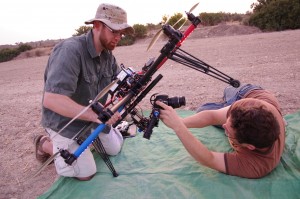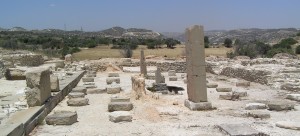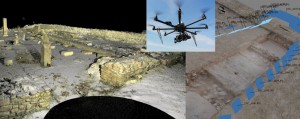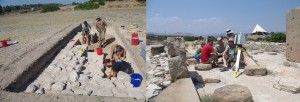KAMBE Takes to the Skies
Just back from a short but successful trip to Cyprus (Nov. 8-12) with Prof. Jesse Casana and graduate student Adam Wiewel from the University of Arkansas to test out CAST’s Unmanned Aerial Vehicle (UAV) or “drone”. We conducted a number of night time aerial surveys using a thermal camera at Kalavasos-Ayios Dhimitrios in order to see […]
Welcome
Welcome to the website of the The Kalavasos and Maroni Built Environments (KAMBE) Project, an interdisciplinary investigation of the relationships between urban landscapes, social interaction, and social change on the island of Cyprus during the Late Bronze Age (c. 1650-1100 BCE).
Kalavasos-Ayios Dhimitrios
Previous excavations have revealed parts of a thriving Late Bronze Age city, including the monumental Building X with its “Pithos Hall” (shown here), where the remains of over 50 massive storage jars, which once contained olive oil, were recovered. But how were these excavated areas woven together into an urban fabric?
Maroni
Survey and excavations have revealed several areas of Late Bronze Age settlement in the Maroni Valley, including a monumental complex at Vournes and an industrial port at Tsaroukkas. Were these part of an integrated city or do they represent a low-density or dispersed form of urbanism?
New Digital Methods
The KAMBE Project uses cutting-edge digital and geospatial technologies for detecting, recording and visualizing the archaeological remains of Kalavasos and Maroni, including 3D laser scanning, photogrammetry, and a UAV (Unmanned Aerial Vehicle) with digital and thermal cameras.
Archaeological Geophysics
The KAMBE Project is using magnetometry and ground-penetrating radar (GPR) to detect the remains of buried urban buildings and infrastructure at Kalavasos and Maroni. High resolution GPR survey has allowed us to produce incredibly detailed plans of buried structures.
Experiential Learning
The KAMBE Project trains undergraduate and graduate students in many aspects of field archaeology, from excavation to the latest digital methods for recording and analysis.






